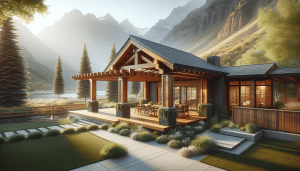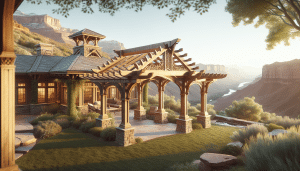When it comes to creating your dream pergola, choosing the right material is a decision that can impact both the aesthetics and longevity of your outdoor structure. At Utah Pergola Company, we understand that making the right choice is crucial. In this ultimate guide, we’ll walk you through the most popular pergola materials and help you decide which one is perfect for your outdoor space.
Wood
Pros:
- Natural Beauty: Wood pergolas exude warmth and timeless charm. They blend seamlessly with the natural surroundings of your outdoor space.
- Customization: Wood is highly customizable. You can stain or paint it to match your home or choose from various wood types like cedar, redwood, or pressure-treated pine.
- Aesthetic Appeal: The grain patterns and texture of wood create a visually appealing structure that can become a focal point in your backyard.
Cons:
- Maintenance: Wood requires regular maintenance, including staining or sealing every few years to protect it from moisture, rot, and pests.
- Durability: While wood is durable, it may not be as resilient as some other materials in harsh weather conditions.
Vinyl
Pros:
- Low Maintenance: Vinyl pergolas are virtually maintenance-free. They don’t require staining, sealing, or painting, making them an attractive option for those seeking a hassle-free solution.
- Durability: Vinyl is highly resistant to rot, insects, and UV rays, ensuring a long lifespan for your pergola.
- Clean Appearance: The smooth, clean lines of vinyl pergolas provide a modern and polished look to your outdoor space.
Cons:
- Limited Customization: Vinyl pergolas may offer fewer design and color options compared to wood.
- Initial Cost: While vinyl may require less maintenance, the initial cost of materials can be higher than wood.
Aluminum
Pros:
- Durability: Aluminum pergolas are exceptionally durable and can withstand harsh weather conditions, including heavy snow loads and intense UV exposure.
- Low Maintenance: Similar to vinyl, aluminum requires minimal maintenance. It won’t rust or corrode.
- Lightweight: Aluminum is lighter than wood or steel, making it easier to install and transport.
Cons:
- Aesthetic Options: Aluminum pergolas may have a more contemporary appearance, which may not suit all design styles.
- Heat Absorption: Aluminum can become hot to the touch in direct sunlight, which might not be ideal for some climates.
Steel
Pros:
- Strength: Steel pergolas are known for their strength and ability to support heavy loads. They are ideal for areas with heavy snowfall.
- Customization: Steel can be customized with various finishes and styles to match your design preferences.
- Longevity: When properly coated, steel can resist corrosion and maintain its appearance over time.
Cons:
- Maintenance: Steel may require occasional maintenance to prevent rust. Regular inspections and touch-ups are necessary.
- Weight: Steel is heavier than other materials, which can make installation more labor-intensive.
Making Your Choice
Choosing the right material for your pergola depends on your style preferences, budget, and maintenance preferences. Wood offers classic beauty but requires more upkeep. Vinyl and aluminum are low-maintenance options, with vinyl providing a sleek look, while aluminum is durable and lightweight. Steel is a robust choice for those seeking strength and customization.
At Utah Pergola Company, we specialize in helping homeowners make the best choice for their outdoor spaces. Our team can guide you through the material selection process and create a pergola that perfectly complements your vision.
Your pergola is a long-term investment in the beauty and functionality of your outdoor space. Choose wisely, and let us help you turn your dream pergola into a reality. Contact us at 801-784-6082 or visit our website here to get started on your pergola project today.




